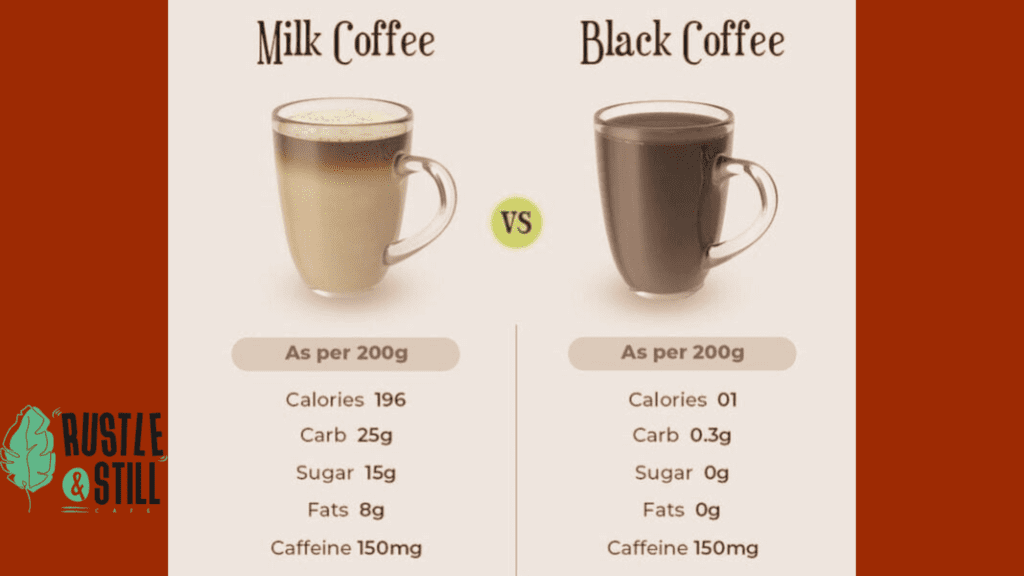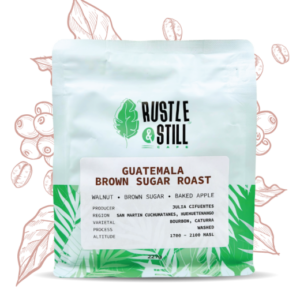As we continue our journey towards understanding the intricate world of coffee, let’s delve into an often overlooked aspect: the calorie count in your beloved cup of joe. Let’s explore the question: How many calories are actually in a cup of coffee? As we sip on this beloved beverage daily, it’s important to understand its nutritional impact.
Coffee, originally discovered in Ethiopia, has become a global phenomenon over centuries. Its rich, inviting aroma, diverse flavor profiles, and energizing effects have captivated millions.
But beyond its enticing characteristics, what does a cup of coffee mean for your diet?
Another burning question, “how many calories are in black coffee?”
In its most basic form, black coffee contains almost no calories. According to the USDA, an 8-ounce cup of black coffee brewed from grounds has just two calories. But let’s be honest, not all of us enjoy our coffee black.
The moment we start adding extras like milk, sugar, cream, or flavored syrups, the calorie count begins to rise.

But what exactly are calories?
In simple terms, a calorie is a unit of energy. Your body uses calories from food for walking, thinking, breathing, and all other bodily functions.
The number of calories your body needs to carry out these basic functions is known as your basal metabolic rate.
Consuming more calories than your body burns can lead to weight gain, while consuming fewer can result in weight loss.
However, not all calories are created equal. While a spoonful of sugar might add quick energy, it lacks the vitamins, minerals, and fiber found in nutrient-dense foods like fruits and vegetables.
Now, let’s circle back to our principal topic – coffee.
Interestingly, coffee has been shown to stimulate metabolism, with studies indicating that caffeine can increase the rate at which your body burns calories. However, it’s important to remember that drinking specialty coffee alone won’t lead to significant weight loss.
Achieving and maintaining a healthy weight requires a balanced diet and regular physical activity.
We’ll also discuss how many calories are found in coffee with milk.
For instance, an 8 oz cup of coffee with 1 oz of semi-skimmed milk contains around 17 calories. Swap that milk for cream, and you’re looking at a significantly higher calorie count.
And if we venture into the realm of lattes, cappuccinos, and mochas, the calorie count can range anywhere from 64 to a whopping 330 calories per cup.
The brewing method can also influence the calorie content, though marginally.
For example, an espresso contains only 15 to 25 calories per serving. Comparatively, ground coffee contains about 1 to 3 calories per cup.
In its purest form, black coffee is a low-calorie beverage, with roughly 2-5 calories per cup; however, the moment we begin to dress up our coffee with milk, sugar, or syrups, the calorie count changes significantly.
Milk, in particular, can add a substantial number of calories to your brew.
For instance, a cup of coffee with whole milk can contain around 19 calories, while the same amount of skim milk adds about 10 calories. Sugar, too, contributes significantly, with a single teaspoon adding approximately 16 calories to your cup.
The world of coffee also offers a plethora of syrup options, each with differing calorie counts. A tablespoon of vanilla syrup, for example, adds about 20 calories, while a similar amount of caramel syrup can add up to 50 calories.
Today, there’s a whole range of plant-based milk alternatives available, from oat milk and soy milk to almond milk. These not only offer unique flavors but are often lower in calories compared to regular milk. For instance, unsweetened almond milk contains just about 7 calories per ounce.
However, it’s important to read product labels carefully. While some plant-based milk alternatives are lower in calories, they may not provide the same nutrients as dairy milk, such as vitamin D, calcium, and iron.
Look for fortified options that are rich in these essential nutrients.
So, how can you enjoy your coffee while being mindful of your calorie intake? Here are a few tips:
- Opt for low-fat milk or plant-based alternatives: These can significantly reduce the calories compared to using whole milk or cream.
- Limit added sugars: Consider natural sweeteners or simply savor the natural flavors of the coffee.
- Choose ‘skinny’ versions of your favorite drinks: Many coffee shops offer lower-calorie versions of their popular beverages.
- Brew at home: This gives you total control over what goes into your cup.
Remember, understanding the nutritional aspects of your favorite brew allows you to make informed choices and enjoy your coffee in a way that aligns with your health goals.
Lastly, while coffee in its purest form has minimal calories, additives can significantly increase its caloric value. Being aware of this can help you make informed decisions and maintain a balanced diet without giving up your cherished coffee ritual. Remember, the goal isn’t to eliminate the joy of coffee, but to harmonize it with our health goals. Because at the end of the day, coffee is more than just a drink; it’s a celebration of flavor, culture, and personal moments.
Stay tuned for more insights on your favorite brew. Stay healthy, stay caffeinated, and keep savoring each sip with a renewed sense of awareness. Until next time, here’s to mindful sipping!








